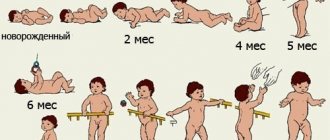Baby development at 4 months: height, weight and motor skills
At the developmental stage of a child at 4 months, his weight is usually twice as much as it was at birth (you can find out whether your baby’s weight is normal using a special table).
If you are concerned that your baby is not eating enough or is gaining weight too slowly, take your baby to the pediatrician. By the fourth month, your baby is already quite dexterous and can do quite a lot with his hands, which work together when he grabs a toy or shakes it. In truth, these same hands will grab absolutely any object they can reach: be it a colorful soft toy or your hair. Perhaps mom should give up earrings, chains and other jewelry for a while.
Anything your baby can reach will most likely end up in his mouth. Tasting objects is one of the main ways for a child to understand the world at this stage of development. This means that it is critical that you remove all small objects from your child’s reach that he could swallow or choke on.
Consider the size of the hole in the toilet paper roll: anything that can fit there is too small to lie next to a four-month-old “sword swallower.”
At 4 months of age, your baby can hold his head up on his own when you hold him in your arms or when you support him in a sitting position. He can already noticeably kick with his legs and knock with his arms. And some children at 4 months are already able to confidently roll over from their stomach to their back and back.
Schedule
For healthy development, you need to follow a routine. It should be followed every day. The daily routine of a four-month-old baby should include:
- awakening from a night's sleep;
- morning routine;
- feeding;
- active games, gymnastics;
- first dream;
- feeding;
- games, massage;
- walk and sleep;
- returning from a walk, feeding;
- games;
- dream;
- games with mom;
- feeding;
- bathing;
- night sleep.
Mommy sets the clock herself. It depends on the character and preferences of the baby and her own.
The most valuable thing a 4 month old baby can do is sleep through the night!
By the fourth month of a child’s development, he usually sleeps peacefully all night long – for seven to eight hours at a time. Moreover, he already sleeps outside the parent’s bed, in his own crib (many modern pediatric doctors advise after 3 months to actively wean the child from sleeping together with his parents).
If we add to this the time of short daytime sleep - this happens on average two or three times - we get from fourteen to sixteen hours of infant sleep per day.
How does a 4 month old baby see the world?
During the first three months, the child has difficulty distinguishing color shades. That is why your baby then preferred bright colored or contrasting black and white objects. Now, by the fourth month, your baby's vision has reached about half normal.
Babies as young as 4 months can already see finer-colored objects, such as seeing a red button on a red shirt. They are also already able to look around the room, although they still prefer to look at people and objects located close to them.
Your baby's eyes can focus and follow moving objects. If you notice that your child crosses his eyes or does not respond to you when you pass by, do not hesitate to show him to the doctor.
By the fourth month, you will most likely notice that your baby's irises have changed color - you shouldn't pay much attention to this for now. This is completely normal! The eye color of babies can change its shade radically from time to time, and only by 7-8 months it will be finally determined.
But don't expect major changes! Of course, this will not happen: today the “lya”’s eyes are clear blue, and tomorrow they will be blue-black. However, within a similar palette, color can really vary quite a lot: from gray shades to blue and green, from brown to green or dark brown... And only at 7-8 months will the child’s eye color be finally established and will no longer change.
How to Help a 4-Month-Old Baby Learn Essential Skills
- If daily gymnastics has become too boring, you can combine it with telling funny nursery rhymes. Children like funny rhythmic poems, especially if the mother combines them with gentle touches to different parts of the child’s body.
- During this period, many begin to play “flyer” with the child, throwing the baby up to the ceiling or supporting him under the belly, carrying him around the room by weight, but in these cases you should carefully monitor the child’s reaction. Such fun can easily frighten a newborn to the point of hiccups and crying.
- If a child does not yet know how to roll over, you need to help him master this useful science. Place a bright, attractive toy to the side, but in the field of view - the baby will reach for it and be able to change the position of his body. In some cases, pediatricians recommend tying bells on babies' wrists - melodic sounds when moving will encourage your child to be more active.
- Constant communication with the outside world during this period is very important - of course, the baby still understands little, but you need to talk to him constantly. Comment on your actions, introduce objects and people - this will help your baby become a friendly and sociable child.
- If you think that the time has not yet come to read fairy tales to your baby, then you are mistaken. Start introducing them to your baby from the age of 4 months - however, you need to read them not at night, but during the period of active wakefulness. Turn this event into a real theatrical performance: use puppets, change voices, express emotions with intonations - all this develops the child’s phonemic hearing and contributes to more active psycho-emotional development.
Don't worry if your 4-month-old baby doesn't know everything he should yet - just help him using our tips and your own maternal instinct.
Metabolic processes in children proceed much faster than in adults. This happens because the baby’s body develops and requires more energy. Since, unlike fats, proteins are not able to accumulate, protein metabolism occurs most quickly in the human body.
Baby at 4 months: time to try new tastes!
Some doctors do not recommend starting solid foods until the sixth month. However, depending on the size - large children may not have enough breast milk or formula - in the fourth month of the child’s development, you may well make the first attempt to supplement the baby with “thick” food. With your pediatrician's permission, of course. At the first feeding of solids, your baby should hold his head up and sit up straight while you support his back.
Usually, for the first complementary feeding, rice porridge fortified with iron, diluted either in formula or in breast milk, is chosen. The consistency of the porridge should not be thicker than the milk mixture.
Pay attention to how your baby will accept a spoon for the first time: at this age, babies still have a developed tongue thrust reflex. If this reaction prevents you from feeding, you will most likely have to go back to formula and then try thick feeding again after a week or two.
How does a 4 month old baby communicate?
At 4 months, the child begins to notice that people around him react to his actions. When a child cries, you come to his aid. When a child drops something on the floor, you pick it up and put it back in his palm. Many kids start to get a kick out of this: they drop something over and over again, only to watch their parents pick it up again and again.
At this age, children begin to learn the basics of communication. They actively express their own emotions through various sounds, squeals and laughter. Also, with the help of enthusiastic sounds, the baby expresses joy at the sight of people close to him (those who constantly care for him). You will see that the child begins to use facial expressions to express his overwhelming feelings: from a happy smile or surprise to an angry or dissatisfied facial expression. And of course, at this age, your child learns to recognize and understand the emotions that he sees on your face and hears in your voice.
And therefore, don’t be shy, grimace and clownery in front of your baby at every opportunity! After all, with this you are not just entertaining the baby, you are developing him...
What a 4 month old baby can do: short and clear
- Grabs toys with both hands at once;
- He recognizes his household members not only by face, but also by voice;
- Violently expresses emotions through facial expressions and sounds;
- The child knows his name and responds to it;
- Most babies at 4 months are already actively starting to try to roll over from their back to their stomach;
- Most babies at 4 months like to listen to music;
- Lying on his stomach, the child begins to briefly raise his head and shoulders, looking around with interest;
- The baby likes to grab himself by various parts of the body, most often by the legs, by the face;
- The baby can already sleep all night without waking up for feedings;
How to help your baby develop
Family members should help four-month-old babies develop properly. It is not recommended to rush things. But playing together, massage, and gymnastics will not only help children, but will also strengthen family relationships.
Games with a child
How to play with a baby at 4 months is a pressing question. The baby spends a long time on the baby rug. He looks at the pictures, presses the keys and listens to the sounds made. It is important to place the mat in a safe place on the floor, away from sharp corners of furniture. The kid is interested in “Ladushki”, “Magpie-Crow”. He willingly listens to songs and poems, especially those sung by his mother.
You can play with your baby any time he is awake. But it is recommended to stop active games 30-60 minutes before bedtime. The baby must calm down for a healthy sound sleep.
Massage
You can ask your doctor to prescribe a strengthening massage. It is carried out by a nurse. But it is much more important to massage the baby to the mother herself. It is useful to combine massage with gymnastics. It is recommended to do the procedures after the baby wakes up and before bathing in the evening.
Be sure to massage your body with warm hands.
It is important to speak kindly to the baby. The baby likes funny poems, songs, and nursery rhymes. The pace of speech should match the movements of mommy’s hands. Evening massage is different from morning massage. It should not be combined with gymnastic exercises. Hand movements should be slow, mother’s voice should be quiet, poems and songs should be calm.
Exercises with the baby
A set of developmental exercises is required for a 4-month-old baby. For full development, the baby needs various tactile sensations. The baby enjoys studying the textured surfaces provided by his mother.
During exercises, the mother must communicate with the baby. It is required to name objects and repeat words with clear articulation. It is useful to take the baby in your arms, stroke his back, and dance with him. The child appreciates such communication. The kid is interested in beautiful pictures in books. Mommy should share his delight. The little one should feel the love and care of loved ones.










